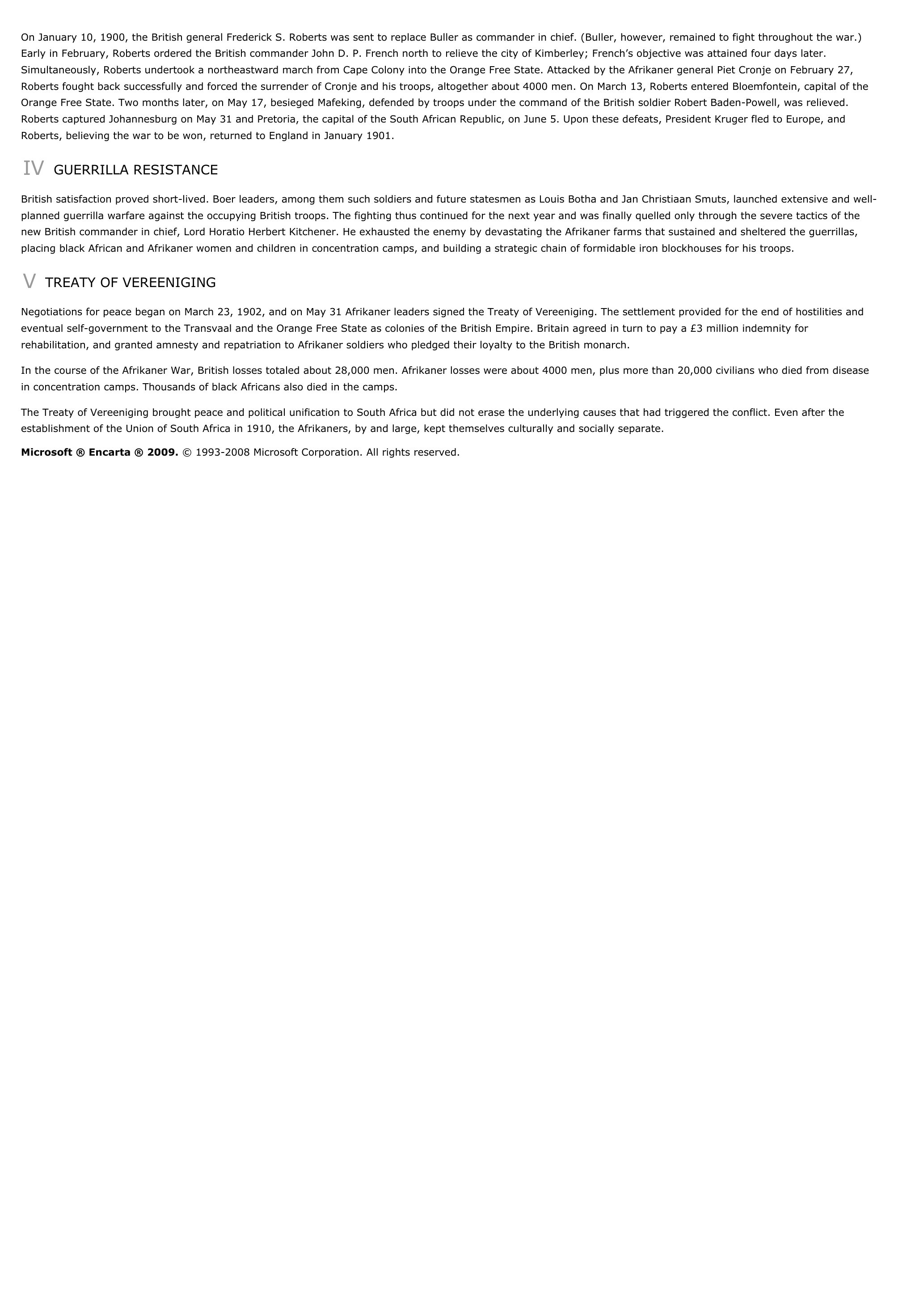Boer War - history.
Publié le 26/05/2013
Extrait du document
«
On January 10, 1900, the British general Frederick S.
Roberts was sent to replace Buller as commander in chief.
(Buller, however, remained to fight throughout the war.)Early in February, Roberts ordered the British commander John D.
P.
French north to relieve the city of Kimberley; French’s objective was attained four days later.Simultaneously, Roberts undertook a northeastward march from Cape Colony into the Orange Free State.
Attacked by the Afrikaner general Piet Cronje on February 27,Roberts fought back successfully and forced the surrender of Cronje and his troops, altogether about 4000 men.
On March 13, Roberts entered Bloemfontein, capital of theOrange Free State.
Two months later, on May 17, besieged Mafeking, defended by troops under the command of the British soldier Robert Baden-Powell, was relieved.Roberts captured Johannesburg on May 31 and Pretoria, the capital of the South African Republic, on June 5.
Upon these defeats, President Kruger fled to Europe, andRoberts, believing the war to be won, returned to England in January 1901.
IV GUERRILLA RESISTANCE
British satisfaction proved short-lived.
Boer leaders, among them such soldiers and future statesmen as Louis Botha and Jan Christiaan Smuts, launched extensive and well-planned guerrilla warfare against the occupying British troops.
The fighting thus continued for the next year and was finally quelled only through the severe tactics of thenew British commander in chief, Lord Horatio Herbert Kitchener.
He exhausted the enemy by devastating the Afrikaner farms that sustained and sheltered the guerrillas,placing black African and Afrikaner women and children in concentration camps, and building a strategic chain of formidable iron blockhouses for his troops.
V TREATY OF VEREENIGING
Negotiations for peace began on March 23, 1902, and on May 31 Afrikaner leaders signed the Treaty of Vereeniging.
The settlement provided for the end of hostilities andeventual self-government to the Transvaal and the Orange Free State as colonies of the British Empire.
Britain agreed in turn to pay a £3 million indemnity forrehabilitation, and granted amnesty and repatriation to Afrikaner soldiers who pledged their loyalty to the British monarch.
In the course of the Afrikaner War, British losses totaled about 28,000 men.
Afrikaner losses were about 4000 men, plus more than 20,000 civilians who died from diseasein concentration camps.
Thousands of black Africans also died in the camps.
The Treaty of Vereeniging brought peace and political unification to South Africa but did not erase the underlying causes that had triggered the conflict.
Even after theestablishment of the Union of South Africa in 1910, the Afrikaners, by and large, kept themselves culturally and socially separate.
Microsoft ® Encarta ® 2009. © 1993-2008 Microsoft Corporation.
All rights reserved..
»
↓↓↓ APERÇU DU DOCUMENT ↓↓↓
Liens utiles
- Algerian War of Independence - history.
- Boer War.
- War of 1812 - History.
- French and Indian War - Canadian History.
- Iran-Iraq War - History.

































